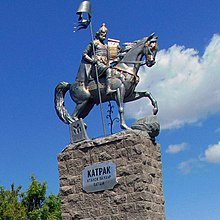
Summary
Kotrag was according to Nikephoros I of Constantinople a son of Kubrat of the Dulo clan of Bulgars. Following the death of his father, he began to extend the influence of his Bulgars to the Volga River. He is remembered as the founder of Volga Bulgaria.[1][2][3]

| Kotrag | |
|---|---|
| Reign | 665 - around 700 |
| Died | around 700 |
| House | Dulo |
| Father | Kubrat |
| Religion | Tengrism |
Honour edit
- Kotrag Nunatak on Greenwich Island in the South Shetland Islands, Antarctica is named after Kotrag.[4]
- In the Republic of Chuvashia in the village of Shemursha on Jule 30, 2022, a monument was erected to the founder of the Volga Bulgaria - Kotrag
- On January 12, 2023, a monument to the founder of Volga Bulgaria, Khan Kotrag, was erected in Shiryaev on Popova Hill. The monument was made by the famous Bulgarian sculptor Dishko Dishkov. The official opening of the monument to Khan Kotrag is scheduled for spring.[5]
Name edit
The possible origin of the name of khan Kotrag from the Chuvash name Kătrak and Kătrashka, which in translation means Curly, a common pre-Christian name among the Chuvash. In the Kipchak languages, the word Curly is translated as tat. Bodrә (Бөдрә) on kaz.Buyra (Бұйра). Perhaps the name Kotrag was given in honor of the great-grandfather Kobrat, who also bore the name Kotrag in honor of whom the whole tribe of Kutrigurs was named.[6]
Procopius also recorded a genealogical legend according to which:
...in the old days many Huns, called then Cimmerians, inhabited the lands I mentioned already. They all had a single king. Once one of their kings had two sons: one called Uti oghur and another called Kutri oghur. After their father's death they shared the power and gave their names to the subjected peoples, so that even nowadays some of them are called Utigurs and the others - Kutrigurs.[7]
Many researchers of Chuvash history note a common name before christian chuvash as Kutri (chu.Kăтри) - which means Curly, perhaps this name is also reflected in Procopius.[6]
Gallery edit
-
Opening of the monument to Khan Kotrag in the Chuvash Republic, the village of Shemursha, in memory of the founder of the Volga Bulgaria. July, 30. 2022
-
Monument to the founder of the Volga Bulgaria Khan Kotrag in the Chuvash Republic
References edit
- ^ Mercia MacDermott, Bulgarian Folk Customs, Jessica Kingsley Publishers, 1998, ISBN 1853024856, p. 20.
- ^ "Bulgar | people". Encyclopedia Britannica. Archived from the original on 2018-09-04. Retrieved 2018-09-04.
- ^ "BULGARIAN HELSINKI COMMITTEE" (PDF). Archived (PDF) from the original on 2018-09-04. Retrieved 2018-09-04.
After the death of Kubrat, however, the newly founded and still unstable state collapsed and the Bulgar tribes started a new diaspora. Part of them settled permanently on the territories of the former Great Bulgaria; others, under the leadership of Kubrat's son Kotrag, headed northward and established themselves in the area of the Volga River. Available historical data points out that in X century the Kotragian Bulgars adopted Islam as their religion while preserving their Turkic language.
- ^ "Kotrag Nunatak". SCAR Composite Gazetteer. Archived from the original on 2018-09-04. Retrieved 2018-09-04.
Named after Khan Kotrag, founder of the Kingdom of Volga Bulgaria in the 7th Century AD.
- ^ "В Татарстане установили памятник хану Контрагу – основателю Волжской Булгарии". bgnews.bulgar-rus.ru. 2023-01-17.
- ^ a b Димитриев, Василий Дмитриевич (1993). Чувашские исторические предания: Очерки истории чувашского народа с древних времен до середины XIX века (in Russian) (2 ed.). г.Чебоксары: г. Чебоксары: Чувашское книжное издательство. ISBN 5-7670-0694-6.
- ^ "Proto-Bulgarians - 1a". www.kroraina.com. Retrieved 2022-08-11.


